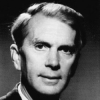Martin Ryle

Martin Ryle
Sir Martin Ryle FRSwas an English radio astronomer who developed revolutionary radio telescope systemsand used them for accurate location and imaging of weak radio sources. In 1946 Ryle and Vonberg were the first people to publish interferometric astronomical measurements at radio wavelengths, although Joseph Pawsey from the University of Sydney claimed to have actually made interferometric measurements earlier in the same year. With improved equipment, Ryle observed the most distant known galaxies in the universe at that time. He was...
NationalityBritish
ProfessionScientist
Date of Birth27 September 1918
In 1947 I married Rowena Palmer, and we have two daughters, Alison and Claire, and a son, John.
We enjoy sailing small boats, two of which I have designed and built myself.
In 1948 I was appointed to a Lectureship in Physics and in 1949 elected to a Fellowship at Trinity College.
I was educated at Bradfield College and Oxford, where I graduated in 1939.
I was born on September 27, 1918, the second of five children.
In 1959 the University recognized our work by appointing me to a new Chair of Radio Astronomy.
During the war years I worked on the development of radar and other radio systems for the R.A.F. and, though gaining much in engineering experience and in understanding people, rapidly forgot most of the physics I had learned.
In 1945 J.A. Ratcliffe ... suggested that I [join his group at Cavendish Laboratory, Cambridge] to start an investigation of the radio emission from the Sun, which had recently been discovered accidentally with radar equipment. ... [B]oth Ratcliffe and Sir Lawrence Bragg, then Cavendish Professor, gave enormous support and encouragement to me. Bragg's own work on X-ray crystallography involved techniques very similar to those we were developing for "aperture synthesis", and he always showed a delighted interest in the way our work progressed.
The benefits of medical research are real - but so are the potential horrors of genetic engineering and embryo manipulation. We devise heart transplants, but do little for the 15 million who die annually of malnutrition and related diseases. Our cleverness has grown prodigiously - but not our wisdom.